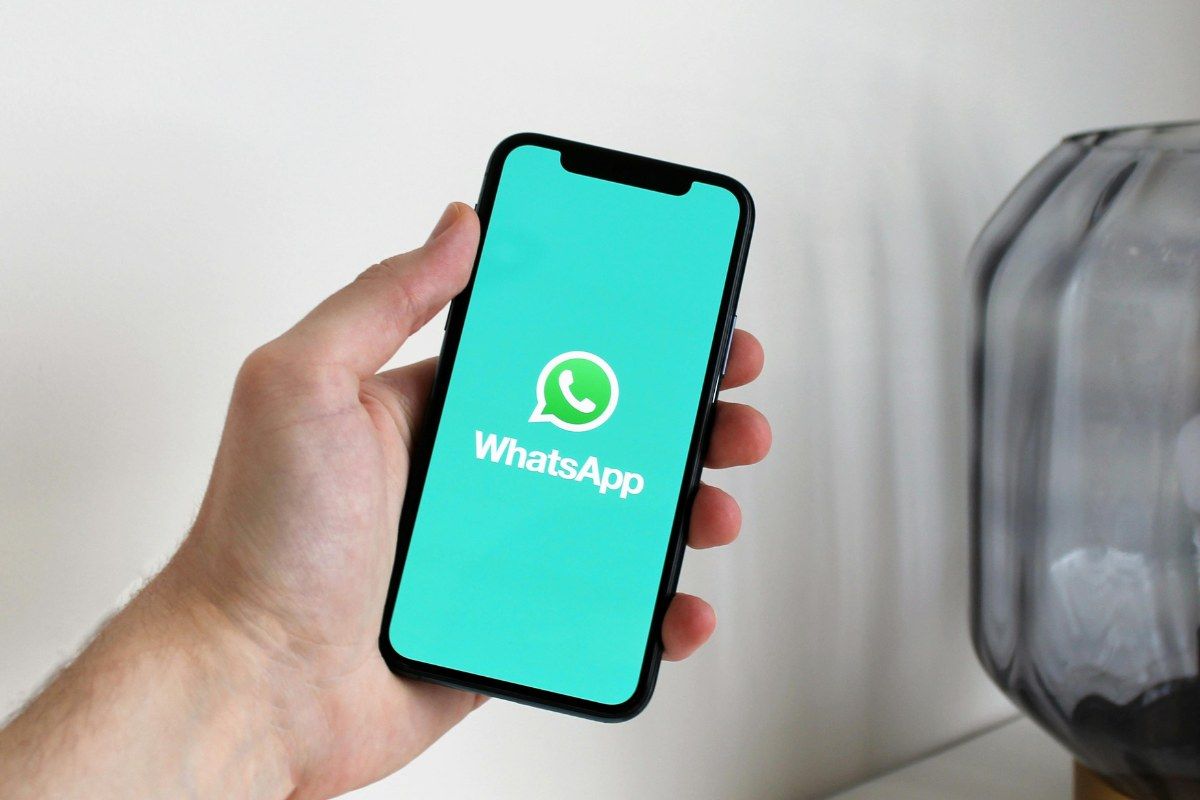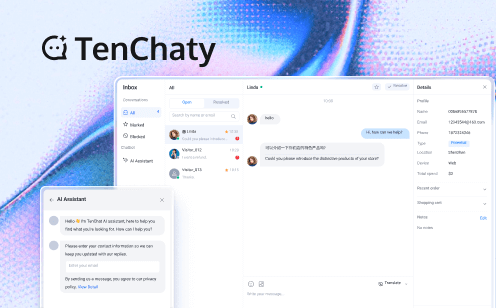For those unfamiliar, what does the WhatsApp app look like? It has a simple, intuitive interface with easy-to-access features for text, voice, and video calls. Are you wondering what app is like WhatsApp? Users with issues about their privacy and security are searching for alternatives that offer more control over their data or better features for work or other personal use. This article helps you find more apps like WhatsApp that provide secure messaging, file sharing, and business-friendly tools. Read now to find one that meets your requirements.

Why Is WhatsApp Popular?
WhatsApp is one of the most used messaging apps because it’s simple, reliable, and free to use. It offers text, voice, and video calls with end-to-end encryption, making sure that only you and the recipient can access your messages.
Another reason WhatsApp is popular is its seamless media-sharing capabilities. You can easily send photos, videos, documents, and voice messages, making it more than a text-based app. The app also works across multiple platforms, from smartphones to desktop computers, allowing users to switch between devices effortlessly.
Key Features to Look for in WhatsApp Alternatives
When looking for similar apps like WhatsApp, it's important to find apps that prioritize privacy, offer multi-device support, and provide reliable media sharing. Consider the following key features to ensure the app fits your communication needs.
- End-to-end Encryption: If privacy is your main concern, choose apps that don’t store metadata or allow third-party access. This level of encryption also applies to voice and video calls, providing full privacy in all forms of communication.
- Cross-Platform Compatibility: A good messaging app should work smoothly on all devices. With this, you can start a conversation on your phone and continue it on your computer immediately.
- Comprehensive Features: Finding one with better file-sharing capabilities is useful for users who frequently send large videos or documents. You should also check if the app supports multiple media formats, such as PDFs, images, and videos, without compressing the file size too much.
- Customization Options: Customization lets you personalize the app to your style and preferences, enhancing usability by allowing adjustments to notifications, themes, and chat layouts for a more enjoyable communication experience.
- Frequent Updates: Regular updates keep the app secure, bug-free, and in line with evolving user needs.

Finding a WhatsApp Alternative
Now you know what features to prioritize when looking for a WhatsApp alternative. Below, we have curated a list of the top messaging apps that offer privacy, functionality, and ease of use.
Facebook Messenger
Are you looking for a seamless social experience? Facebook Messenger lets you send texts, images, and videos effortlessly, just like WhatsApp. Both apps provide secure end-to-end encryption and allow group chats. Messenger also lets you customize chat themes for a more personal touch.
Pros:
- Share photos, videos, and GIFs easily.
- Connect effortlessly with your Facebook friends.
- Features like games and chatbots for fun interactions.
Cons:
- Requires a Facebook account to use.
Signal
If privacy is your primary concern, Signal stands out for its strong encryption and commitment to security. It supports text, voice, and video calls, similar to WhatsApp. Additional features include self-destructing messages and contact verification, making it one of the most secure options out there.
Pros:
- Excellent privacy with no data collection.
- Open-source for full transparency.
- Default end-to-end encryption for all communications.
Cons:
- Group chats are limited to 1,000 members.
Slack
For business teams, Slack combines messaging with productivity. It organizes conversations into channels, much like WhatsApp's group chats. Integrations with apps and tools streamline workplace communication.
Pros:
- Perfect for workplace collaboration.
- Supports many productivity tool integrations.
- Advanced search functions for finding important messages.
Cons:
- Notifications can become overwhelming.
Telegram
For those who prefer customization and large group chats, Telegram offers a sleek interface with options for secret chats and cloud storage. It goes beyond WhatsApp with support for groups of up to 200,000 members.
Pros:
- Supports large groups and channels for broadcasting.
- Customizable chats and secret messaging with encryption.
- Cloud-based storage to save your media.
Cons:
- Some features may confuse new users.
- Public channels can spread misinformation.
Kik
For users who want to remain anonymous, Kik allows chatting without a phone number, appealing mostly to younger users. It shares basic messaging functions with WhatsApp but includes built-in web browsing and fun games.
Pros:
- Easy-to-use, teen-friendly interface.
- Chat without a phone number for extra privacy.
- Interactive features like games and bots.
Cons:
- Less secure than other messaging apps.
- Limited privacy settings.
Skype
Known for video calling, Skype offers more than just voice and video calls. It supports messaging and lets you conduct group video calls, making it ideal for both personal and business communication. Similar to WhatsApp, it offers unique features like conference calls and screen sharing.
Pros:
- High-quality video and voice calling.
- Supports group video calls with multiple users.
- Integrates well with Microsoft tools for easy access.
Cons:
- Requires internet connection for calls.
- The interface may feel outdated compared to newer apps.
Viber
Viber is a strong WhatsApp alternative that combines messaging and calling with encryption. It features public accounts for businesses, allowing companies to connect with users directly. You can also host group chats with unlimited members, ideal for large groups.
Pros:
- Free international calls to other Viber users.
- Public accounts help businesses connect with customers.
- Easy-to-use interface is similar to WhatsApp.
Cons:
- Lacks popularity in some regions.
- Some features may need Viber Out credits for international calls.
- Ads may appear in the free version.
WeChat isn’t just for messaging—it’s a hub for payments, social media, and even mini-programs. Combining all these features makes it much more than just an alternative to WhatsApp.
Pros:
- Features QR code payments.
- Access to a wide range of third-party apps within the platform.
- Combines messaging, payments, and social media in one app.
Cons:
- Heavy data collection and privacy concerns.
- Mainly popular in China; less so elsewhere.
Snapchat
Snapchat is known for its disappearing messages and stories feature. It focuses on visual communication through photos and videos that self-destruct after viewing, similar to WhatsApp's instant messaging.
Pros:
- Fun filters and lenses make chats more engaging.
- Focus on temporary messages and stories.
- Visual storytelling through quick snaps and stories.
Cons:
- Limited text communication options.
- Privacy issues for younger users.
- Not designed for group discussions like traditional messaging apps.
Discord
Originally for gamers, Discord has grown into a platform for communities of all kinds. With voice, video, and text chat, it’s a great option for organized discussions, but less ideal for one-on-one chats.
Pros:
- Perfect for large communities with multiple channels.
- Customizable bots enhance server functionality.
- High-quality voice and video chat for free.
Cons:
- Can feel overwhelming due to many channels.
- Not ideal for casual personal chats.
- Requires setup time for new users.
Build Apps like WhatsApp with TRTC
If none of the messaging apps we discussed meet your needs, why not build your own WhatsApp alternative? With Tencent RTC, WhatsApp-like app development is easier than ever. You can build a fully custom messaging app with secure messaging and additional features. Say no to limited features or privacy concerns—Tencent’s Chat API gives you the power to control everything.
You won’t need to start from scratch when using Tencent RTC. It provides ready-made solutions for messaging, voice, and video calls, saving you time and effort. You can also customize and add features like group chats, file sharing, and even real-time video conferencing, ensuring your app is fully tailored to your needs. With TRTC, building your own secure, reliable, and feature-packed messaging app is simpler than ever.
Conclusion
While WhatsApp is popular for its user-friendly features and reliability, several alternatives provide enhanced privacy protections and additional functionalities. If you consider your specific requirements—such as privacy, ease of use, and file-sharing capabilities—you can find apps like WhatsApp that suit your lifestyle better. If you are a developer, creating your messaging app can be a rewarding venture. Customizing features to align with user needs allows for enhanced functionality, making it more tailored than existing solutions.
FAQs
Which messaging app has the best privacy features?
Signal stands out for its strong focus on privacy. It uses end-to-end encryption by default and doesn’t store user data. Its open-source design ensures transparency, making it a top choice for those who prioritize security in messaging.
Can I use WhatsApp alternatives for business communication?
Yes, you can use WhatsApp alternatives for business communication. Apps like Slack, Microsoft Teams, and Telegram offer features like group messaging, file sharing, and video calls, often with better integration into business workflows. These platforms may provide enhanced security, customization, and team collaboration tools compared to WhatsApp, making them suitable for professional use.
Do WhatsApp alternatives support file sharing and media?
Yes, most WhatsApp alternatives like Telegram, Signal, and Viber support file sharing and media. These apps allow users to send photos, videos, documents, and other file types, often with fewer size restrictions compared to WhatsApp. Some also offer cloud storage for shared files, enhancing their media-sharing capabilities.
If you have any questions or need assistance online, our support team is always ready to help. Please feel free to Contact us or join us on Telegram or Discord. For technical problems, you can also get help directly from developers on Stack Overflow.


